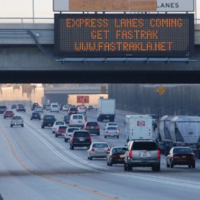Not So Fast: L.A. Tickets Thousands in Opening Days of New Downtown Toll Lanes
 110 Freeway in Los Angeles
110 Freeway in Los Angeles
Los Angeles opened its first toll lanes for business November 10 and has already mailed 12,297 tickets to drivers hurtling in the freeway fast lane past clogged downtown traffic without the requisite transponder to identify them as legal.
Fortunately for the scofflaws, they are only being charged for their time in the toll lines, and their expenses only amounted to $18,358. That’s about a buck and a half apiece. However, when the grace period ends December 10, the cost will go way up for solo drivers wishing to ride in the fast lanes―along with carpoolers, electric and hybrid vehicles and motorcyclists―but who are unwilling or unable to pay the price.
The 11-mile stretch of the 110 Freeway, south of downtown L.A., is part of an urban experiment in traffic control. Another 14-mile toll lane is scheduled to open soon on the nearby Interstate 10. By charging solo drivers extra for the advantage of driving in the high-occupancy vehicle (HOV) lane, cities hope to encourage carpooling and mass transit, better manage traffic flow across lanes, reduce pollution and make money.
Critics like Congresswoman Maxine Waters, a Democrat from Los Angeles, think toll lanes create a two-tier transportation system for the rich and poor. In early 2011, when there was talk in Congress about blocking the project, Waters called it a “traffic system of haves and have-nots.”
Congressman Gary G. Miller, a Republican member of the House Transportation Committee, said he considered a freeway toll to be double taxation because taxpayer money had already paid to build the system. “If you want to do a toll road, build a toll road with private funds,” he told the Los Angeles Times last year. “But don't use taxpayers' dollars to build a road and then charge them to use it.”
Los Angeles Times columnist Steve Lopez, who bought a transponder to ride what he calls the “Lexus lanes,” says they’re a good thing because the money raked in by the city is used on transportation projects that benefit the community at large, like the 59 new buses bought with money from the $210 federal grant that paid for the one-year, 110 Freeway pilot program.
Transponders cost under $35 and an account must be set up with a minimum of $25 in prepayment funds. Everyone who rides in the lanes must have a transponder, even those carpooling (although they can set their transponder to “carpool” and avoid the fare. Toll charges range between 25 cents and $1.40 per mile, depending on surrounding traffic conditions. There are discounts available for low-income drivers.
But drivers could incur some large expenses if they mess up or try to sneak into the lanes. Metro fines for being in the wrong place are $25, plus a $30 charge if they’re late. If the CHP catches someone without the device, the fine is $154. If they detect a solo driver setting their transponder to “carpool,” the fine is at least $341.
–Ken Broder
To Learn More:
Thousands Hit with Toll Lane Citations (Office of L.A. County Supervisor Zev Yaroslavsky)
Thousands of Citations Issued to Motorists on the 110 as Metro Preps for New Toll Lanes on the 10 Freeway (by Maritza Velazquez, San Gabriel Valley Tribune)
Freeway HOT Lanes: Betting on Success (by Ashley Thomas, Frying Pan News)
Half CA/I-110 Express Lane Users Are Solo Driver Buy-Ins, Tolls Average 54c/Mile (TollRoad News)
Toll-lane Project Faces Renewed Opposition in Congress (by Richard Simon, Los Angeles Times)
- Top Stories
- Controversies
- Where is the Money Going?
- California and the Nation
- Appointments and Resignations
- Unusual News
- Latest News
- California Forbids U.S. Immigration Agents from Pretending to be Police
- California Lawmakers Urged to Strip “Self-Dealing” Tax Board of Its Duties
- Big Oil’s Grip on California
- Santa Cruz Police See Homeland Security Betrayal in Use of Gang Roundup as Cover for Immigration Raid
- Oil Companies Face Deadline to Stop Polluting California Groundwater





